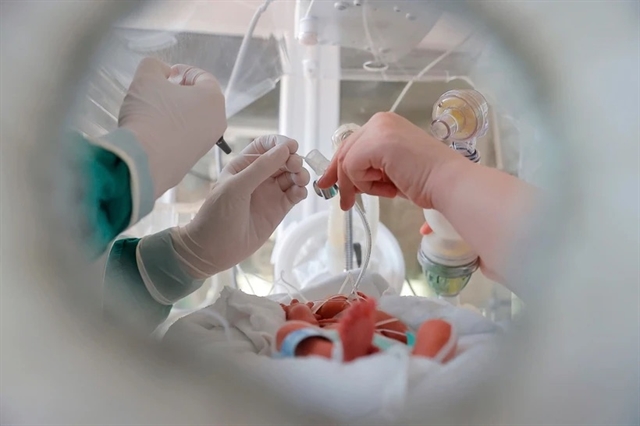 Society
Society

 |
| A newborn baby is given treatment. VNA/VNS Photo |
HÀ NỘI – Around 40,000 children are born with congenital disabilities in Việt Nam every year, according to health sector statistics.
Up to 80 per cent of children with genetic disorders are born to healthy parents or parents with no family history of these conditions.
In many cases, the parents are healthy but carry recessive genes for specific diseases, and the embryo's cells can develop new mutations as it grows in utero.
Most recessive genetic diseases do not manifest in the parents, but leave serious consequences for the offspring. The risk of disease is random and independent in each pregnancy and childbirth.
The Hà Nội Andrology and Infertility Hospital has recently reported a case in which a woman lost two children to genetic disease.
Her first child was born healthy in 2016. But not long afterwards, the baby’s health declined abnormally, and doctors could not find a clear cause. The infant ultimately passed away.
Two years later, the woman's second baby was born. After one month, he had persistent pneumonia — but treatment did not improve his condition, and he died one year later.
After five years, she and her husband came to the Hà Nội Andrology and Infertility Hospital to find the cause of the diseases before their next pregnancy.
Head of the hospital's Department of Scientific Research and Physician Training Dr Bùi Thị Phương Hoa, who investigated the couple’s case, said that after a detailed review of the family’s medical history and that of both deceased children, the cause was a suspected genetic mutation.
Since the two children had passed away, direct testing was not possible. Instead, doctors proposed indirect genetic testing using parental DNA to pinpoint the cause.
Through gene sequencing and consultations with specialists, doctors discovered that the woman carries a disease-causing mutation in the CYBB gene — an X-linked recessive disorder responsible for Chronic Granulomatous Disease (CGD).
The disease manifests in infancy as recurrent pneumonia with poor response to treatment. Although the woman herself is healthy, as a carrier, she passed the mutated gene to her children, who inherited the disease and died from its complications. The diagnosis matched both clinical and genetic classifications.
CGD is a rare inherited immunodeficiency caused by gene mutations, weakening the immune system and making the body prone to life-threatening infections. It affects approximately one in 200,000 to 250,000 people.
Given the genetic risk, the doctor advised the couple to pursue assisted reproduction with pre-implantation genetic testing to ensure a disease-free embryo.
Last year, they successfully underwent embryo transfer and had a healthy baby, free from the inherited disorder.
Dr Hoa explained that single-gene disorders are caused by mutations in just one gene and can be classified by inheritance patterns. Dominant disorders occur when one parent passes on a mutated gene, causing the child to inherit the disease. Recessive disorders require both parents — often carriers without symptoms — to pass on the mutated gene for the child to be affected.
Many carriers of recessive disorders are asymptomatic, yet their children can suffer serious, even fatal conditions. The risk of passing on such disorders is random and independent with each pregnancy, underscoring the importance of genetic awareness for couples.
So far, scientists have identified around 6,000 single-gene disorders, including thalassemia, haemophilia, brittle bone disease, metabolic disorders, spinal muscular atrophy, Duchenne muscular dystrophy, skeletal dysplasia, phenylketonuria, neurofibromatosis and primary immunodeficiency. These conditions significantly impact health and quality of life.
More alarmingly, these disorders are hereditary and may affect future generations if undetected and untreated, Hoa said.
Among the genetic diseases caused by gene mutations in parents, thalassemia — a blood disorder in which production of haemoglobin is reduced — has a very high mortality rate worldwide. Both the mother and father carry the disease gene, and children born with the disease cannot be cured and must receive treatments for life.
However, if couples fully understand the disease, and proactively take preventive measures, they could have a healthy child.
International Thalassemia Day is on May 8 every year. On this day, the medical sector and hospitals call on people to raise awareness of both the disease and preventive measures for genetic diseases in general, allowing more people to give birth to healthy babies.
The Ministry of Health has thus regularly provided measures to improve population health overall as well as warnings for those who should consider getting genetic tests. These include couples about to get married for premarital check-ups, pregnant women, families with a history of single-gene diseases and couples with children with single-gene diseases.
A specialist can give advice depending on each particular case.
Thanks to advanced technological applications in reproductive health, many couples are now able to have babies without genetic diseases or other medical conditions. VNS




